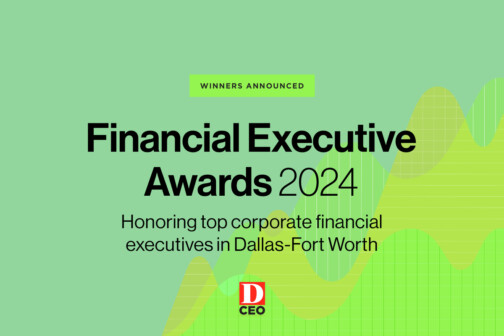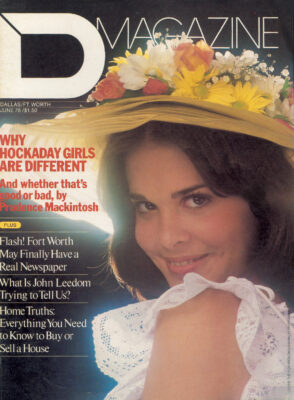Councilman John Leedom sits restlessly at a horseshoe-shaped table in a conference room on the fourth floor of the new City Hall. Like the other members of the City Council gathered for this Monday afternoon “workshop” on the bond program, Leedom is braced for along session of political give and take. Mayor pro tem Bill Blackburn is laying out what sounds to be a rather innocuous set of financial figures when the words “funding formula” cause Leedom to prick up his ears. He begins fidgeting with his pencil, eyeing Blackburn intently, until Blackburn finishes and Leedom quickly interjects: “I have some question in my mind about the adoption of the formula.”
Leedom launches into what, to a casual observer, seems a confusing assessment of the financial package, while Blackburn’s brow becomes twisted with consternation. As Leedom’s verbal barrage finally ends, Blackburn leans forward. “John,” Blackburn says, “I’m not sure I understand you.”
Leedom attacks the issue again, his words emerging in their usual torrential spray. Now it’s Mayor Bob Folsom’s turn to eye Leedom quizzically. Leedom ends his argument. “John,” says Folsom, “I don’t understand what you’re saying.”
Minutes later, however, the council is embroiled in a heated exchange. Councilman Steve Bartlett, after Leedom’s prelude, has made an unexpected motion to change the basic funding formula for the arts portion of the bond program. Folsom and Blackburn are furious. “This is one helluva time to bring this up,” says Blackburn. “Now I’ve seen politics at its worst,” says Folsom. Leedom, undaunted, carries on his argument. Finally Folsom turns to Leedom in exasperation and says, “John, why, until now, have you kept your mouth shut for three months about this? You’ve never shut your mouth before.”
John Leedom’s face is flushed with the heat of debate. Behind his odd glasses (with a rainbow and a pot of gold painted in a corner of the right lens), his eyes are alive. He’s done it again.
Two days later, in his stark City Hall office, John Leedom is in the midst of a long and interesting (but, it seems to me at the time, slightly convoluted) explanation of some aspect of his political philosophy. His desk phone rings and he answers it. It is someone with the wrong extension. He turns back to me immediately and says, “Now, where was I?” I have no earthly idea where he was. I’m paralyzed with embarrassed silence. Leedom smiles a comforting smile of recognition. “I even lost myself this time,” he winks, “which isn’t hard to do.’”
The following afternoon, in the quiet of his fenceless back yard, John Leedom is sitting overlooking a tranquil spring-fed pond, sipping iced tea. Here in the heart of his own District 3, in the lap of upper middle class North Dallas off Royal Lane, Leedom sits in a lounge chair next to the swimming pool and gazes out over his councildom. He is, of course, still talking. This time he is answering a question about his public image, an image associated with the far-right, Reaganite wing of the Republican party. His voice is a contradiction: His brisk staccato speech patterns do battle with his naturally rounded southern inflections, ending up in words like “bidniss.”
“There’ve been many times,” John Leedom is saying, “I think I, I don’t know, I guess, uh, you’re right the people could say you’re there but if you’re not there, I use the expression they can call me an alcoholic if they want to, but that’s a dangerous one because I don’t drink. You’ve gotta make, uh, whatever people say about your image is only as true as you let it keep on being. So you become aware that, that again it’s, which is conditional, uh, is traditional with what I was saying earlier that if you can be clear where you stand. But let me go back a little bit. I guess for all of us 1 think it has to do with everything you do. It has to do with bidniss certainly. One problem, the biggest problem always is communication. But whatever the job is, I think it’s a need for the person, uh, to make it clear. So if that develops a personality, I, I do try to keep working, because my way of talking is not that, uh, I wander around. I’m, I talk in shorthand sometimes and I’m aware of that. I talk too much, it’s a problem, but I think, uh, in the political sense.”
Mr. Leedom, I wanted to say, I’m not sure I understand what you’re talking about.
Actually, I think I do understand what John Leedom is saying. I do now, anyway. But only because I’ve got him on tape and can listen again and again. I’ve learned how to listen to Leedom, and that’s patiently. John Leedom knows what he’s saying. His philosophies are simple, his tenets are basic. You just have to wait for him to get them out.
Leedom is a graduate of Rice, an electronics engineer by profession, and so perhaps it’s his technological mind that causes him to speak in patterns of conical spirals. If you ask him a question, consider his answer in the shape of a cone. His response begins at the base, with a discussion of the question’s broadest ramifications, and gradually weaves its way upward around the cone until it finds the peak, the essential answer. Very simple, really.
The problem for John Leedom, though, and for those who deal with him, is that most of the world doesn’t think in conical spirals. So for much of the Dallas body politic. Councilman John Leedom is an exasperating fundamentalist and an intransigent ideologue. Some phrase it differently.
To a reporter, Leedom is likeable because he talks. He talks candidly, cooperatively, effusively. He has no use for the phrase “off the record.” Says one member of the regular City Hall press corps, “Leedom has been like a torrent of fresh water running through City Hall. The ’off-the-record’ arrangement has been a lingering problem there. It becomes increasingly difficult to remember who said what under what stipulations. It becomes confusing on both sides as to what’s the news and what’s the truth. Leedom is absolutely forthright and I think most of the press is grateful, in spite of the fact that most of us are at the other end of the spectrum from him in terms of personal politics. You already know that if you go to Leedom with a straightforward question, you’ll get a straight answer. Well, not exactly straight. But genuine.”
To a businessman, John Leedom is an iconoclast. At the age of 29, Leedom and a partner established a small wholesale electronics shop on Ross Avenue. The highly successful company, of which Leedom is now president, has grown under his guidance into a major electronics parts distributor. His corporate philosophy is not a common one. It’s the golden rule. “Our company,” says Leedom, “is copied after Sears, the marketing giant. You know, ’the customer is always right’ and ’satisfaction guaranteed.’ If you give more value than you’re asked, you’ll prosper. We’ve seen that the golden rule way of life in business really works.” His company motto, also copied, in this case from a firm in Florida, is “Your Friendly Distributor.” All of which would be enough to elicit skeptical snickers, except that Leedom’s goody-goody sincerity (he himself often says, “I know it sounds corny, but. . .”) has little semblance of self-righteousness. It’s more an ardent matter of principle. The pervasiveness of principle in his business philosophy is almost fanatical. Consider one of his company’s rigid policies: His delivery truck drivers are rewarded annually not on the basis of number of deliveries or service efficiency, but on the basis of each driver’s traffic safety record.
Leedom’s devotion to his own set of principles hasn’t led him into the bosom of the downtown business community. Says one Dallas businessman, ’On a political basis, a lot of people in the business community just don’t like Leedom. They presumed that he was one of them, responsive to their special needs, and discovered he wasn’t.” Leedom is an unlikely water boy for any special interest, but especially the business community. Because John Leedom, businessman and firm conservative, is truly anti-establishment. He comes from a tradition that thinks of Republicans in Dallas as forever standing on the outside and knocking on the door, but never really making it inside. “All that’s really happened under Folsom,” says Leedom, “is that the old downtown business establishment has been replaced with a new downtown business establishment which is really just the same.” John Leedom isn’t in it. And he doesn’t want to be.
To a politician, John Leedom is either an enigmatic ally or a belligerent adversary. He doesn’t make things easy for anyone, least of all for himself, though that’s by choice: “I enjoy getting into the action early.” Perhaps that’s atonement for the relative ease of his electoral career to date.
Having shown little prior political ambition, Leedom, in his first year at Rice, was convinced by friends to run for freshman class treasurer as a member of the newly formed “Rice Progressive Party” (he laughs now at the irony of the name). Leedom won handily. He was unopposed. His political interests, particularly his conservative ideology, were nurtured through the years, but his role was seldom an active one; he was mainly, as he says, “supportive of others to be elected.” His organizational politics found an outlet from 1962 to 1966 as chairman of the Dallas County Republican Party (“Being a Republican then was not as easy as it now seems to be. We lived through some lean days.”). In those and succeeding years, he has successfully supported such conservatives as John Tower and Jim Collins, and, unsuccessfully, Barry Goldwater and Ronald Reagan. But it was not until three years ago that he became an active candidate again when friends convinced him to run for City Council. “I think my motivation was mostly a matter of internal guilt,” he says, “after twisting so many other arms to run and turning down so many others. Then this one came along with hardly any reason to say no.” If his motivation was not impressive, his opposition was. Adlene Harrison was the Place 3 incumbent and a high-profile political figure. But Harrison, perhaps fearing difficulty with the new single-member district voting arrangement, decided instead to run in the new at-large place. Leedom won Place 3 handily. He was unopposed. Last year he was reelected, unopposed.
Because he has never been challenged at the polls, because, in fact, he has never had to mount a real campaign, it is easy to wonder about Leedom’s constituency. Is a constituency that has never actually chosen him really a constituency at all? Does he perhaps enjoy an absence of special interest accountability which allows him the independent, ideological voice he trumpets in City Hall? “A lot of people in the political process,” says Leedom at the apex of a conical spiral about the historical importance of flags, “are more concerned with where the people want them to be and then try to position themselves where a lot of people want. At first blush you think, well, isn’t that what it’s all about. But on the other side, if a person always makes it clear where he stands, he can be chosen or rejected, so I try to keep my flag flying high. Not so everybody agrees with it but so that I won’t be wavering around. Not to say that people can’t influence you, but if a thousand people came to me about unionizing the city’s work force, I wouldn’t vote for it. I have my reasons.”
If Leedom’s constituency is ever thwarted by his independence, it is nothing compared to the frustrations endured by his fellow council members. “Yes,” says one, “John is forthright – and that’s refreshing – but in any issue that comes to the council, he seems to have his mind made up beforehand. John doesn’t argue for the sake of discussion, he argues with the intention of persuading you to his side. And he loves it – he could spend 45 minutes arguing about whether or not to dim the lights. He’s not at all mean and he never holds grudges, but I’ve never known John Leedom to change his mind. Nobody really tries to argue with him anymore except Folsom, just to keep him in check.”
Leedom, of course, is not blind to his political personality and admits trying to curb his argumentative instincts. “I’ve occasionally resorted to keeping score on myself to keep me from talking too much. But I wouldn’t say I’m inflexible. It’s a depth of knowledge,” he says, in a manner more blithe than boastful. “My mind is changeable, but a lot of people just aren’t effective at changing it. There are only two people on the council who are unintimidatable. And Folsom’s the other one.” He chuckles. “Darn it.”
Leedom’s political posture is shaped by theorems. His life, in fact, seems willfully ruled by a headful of elemental propositions. “There are two common denominators in the world, in my opinion. One is love of children and the second is the understanding of money.” Or, “I have a sort of five-point philosophy of life. In this order. Number one is the Lord. Second is the country and community. Third is family. Fourth is profession, the company. And fifth is yourself. 1 try to grade myself every year to keep a balance percentagewise.”
If there is a central pillar in the life philosophy of John Leedom, it is an almost profound belief in the virtues of the free enterprise system. His conversation is punctuated by it, his politics are governed by it, his life appears devoted to it. And he’s unequivocal about it. After spiraling a cone by analogizing, as he so often does, that the private free enterprise system is like a parachute, he says, “The answer to the city’s problems, any city’s, is, of course, a good healthy economic environment within the context of private free enterprise. There is a lack of understanding of how the free market operates. It is not widely taught and has to be studied. If you understand something, you’ll have confidence in it succeeding. And with an understanding of the private free enterprise system comes a faith that it works. Dallas is young enough to prosper in the free enterprise system if we don’t mess it up too much. Don’t hamstring the free enterprise system with bureaucracy. Trust it. The parachute will open.”
His belief in free enterprise (a faith which he readily admits is rooted in the success of his own small business) is not idly reverential, nor is it abstract. In John Leedom’s mind it is practical and practicable. “I think with any issue of social legislation, you can apply the standard that if it leads to a free market decision, the social benefits are best served,” he says, citing as an example his recent efforts against the Surtran contract which restricted the “free market” movements of the cab drivers. However, at times (some would say many times) his applications fall disturbingly close to being ideological nonsense, with an almost naive disregard for real world restrictions. In assessing unemployment, for example, he says, after a conical spiral about Herbert Hoover’s first job, “The problem is that people won’t take the menial jobs. The person who says that’s not the job for me’ has not the understanding of the private free enterprise system. You have to start somewhere to learn what a dollar is worth. Then you realize the free enterprise system is raceless, is colorless.” His rejection of programs for federally funded housing for the elderly is based on the notion that “their greatest need is not financial relief but relief from loneliness – every son and daughter should take care of their own mother and father.” As one council associate puts it, “John has his political theorems and tries to fit them to the smallest detail. You don’t decide where to build streets on the basis of philosophy of government.”
However, it is unlikely that any member of the city council would deny Lee-dom’s value in one substantial regard. He has established himself as the council’s fiscal watchdog. From his position as chairman of the finance committee, he has been instrumental in establishing the city’s department of economic development for the purpose of the city’s first long-range financial planning, in adopting a revolving capital improvement fund, and in bringing the city to balance sheet accounting. “If for no other reason than finally making the city financially accountable,” says one City Hall reporter, “John Leedom’s impact will be felt long after he’s gone.”
Leedom’s fiscal tight-fistedness is not, of course, without philosophical base. His core theory of government is as unflinching, and as brimming with self-assurance, as all the others. After building yet another cone, this one revolving around the precept that “It’s better to teach a person to fish than to give him fish,” he says, “The common function of government now seems to be to serve the people’s wants. My function instead is to care for the fundamentals which serve people’s needs. The I-want syndrome is dangerous and it’s winning. And the source of the disease is federal money. People see it being dished out and think ’let’s get ours.’ People seem to think federal money is a different kind of money. It isn’t. And the increased magnitude of federal funding leads to governmental control of the assets. The next stage is totalitarianism. To say those forces are not at work in this country is to turn your back on a critical situation.”
Contented in his backyard lounge chair, John Leedom sits in curious contrast to his political pertinacity. Gazing serenely through his glasses past the rainbow and pot of gold (which he says are to remind him that there isn’t such a thing), he looks more like a simple, happy hardware store owner than a City Hall zealot. He has already decided that he will not seek another term on the council, saying that four years is quite enough for Life Philosophy Point Two. But can he really stay away from the action he admittedly thrives on? Would he consider, perhaps, a higher level of politics? “I think, uh, I certainly would consider, uh, the old political answer of seeing if the time, what the nature of the thing was, again for the principles which I believe in. 1, uh, probably I’d just as soon try to take it oh as not from the point of view of the principles involved. Of course I’d probably be given a sound thrashing because I have a narrow base.” Having peaked his last cone, he winks behind his rainbow and says, “As long as Bob Folsom will run for mayor and Jim Collins will run for Congress, I don’t see any spots for me. Although king would be nice.”
He downs the last of his iced tea and as we depart he cannot resist offering one last adage: “The most important thing for anybody to remember,” he says, “is not to take yourself too seriously.” John Leedom, then, will be the first to laugh when he reads this consummate quote from one of his fellow city council members: “There is very definitely a place for a John Leedom on the council – but heaven help us if we ever got three or four of them.”
And after he laughs, John Leedom himself will surely shudder at the prospect.
Related Articles

D CEO Award Programs
Winners Announced: D CEO’s Financial Executive Awards 2024
Honorees in this year’s program include leaders from o9 Solutions, Baylor Scott & White, and Texas Capital, as well as our Constantine ‘Connie’ Konstans Award winner Mahesh Shetty of ILE Homes.

Basketball
What We Saw, What It Felt Like: Mavs-Clippers Game 2
A gritty game draws Dallas even in the series.
By Iztok Franko and Mike Piellucci

Baseball
What Should We Make of the Rangers’ Accidental Youth Movement?
It's been 26 years since a defending World Series champion leaned on this many young players out of the gate. In Texas' case, that wasn't the plan. But that doesn't make an influx of former first-round picks a bad thing, either.


